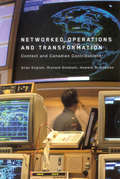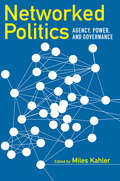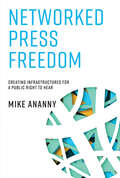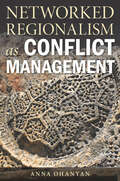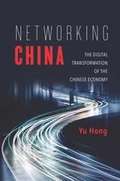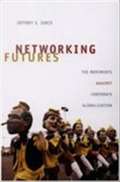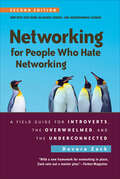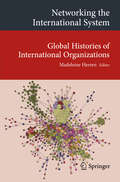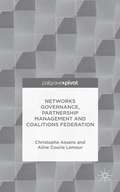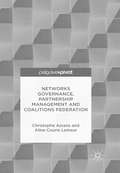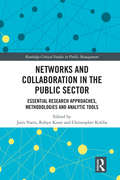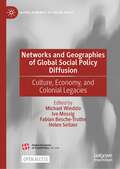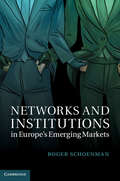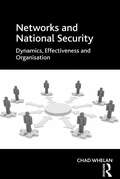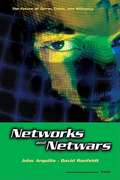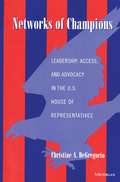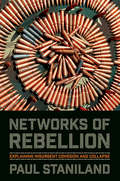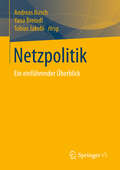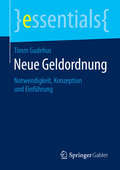- Table View
- List View
Networked Operations and Transformation: Context and Canadian Contributions
by Richard Gimblett Howard Coombs Allan EnglishThe authors consider various approaches to networked operations that are based on the physical environment and cultural context in which armed forces operate. They conclude that a "one size fits all" approach to command and control for networked operations may not be the most effective and suggest a more human-centric approach than the primarily technology-centred model used by the U.S. military.
Networked Politics: Agency, Power, and Governance
by Miles KahlerThe concept of network has emerged as an intellectual centerpiece for our era. Network analysis also occupies a growing place in many of the social sciences. In international relations, however, network has too often remained a metaphor rather than a powerful theoretical perspective. In Networked Politics, a team of political scientists investigates networks in important sectors of international relations, including human rights, security agreements, terrorist and criminal groups, international inequality, and governance of the Internet. They treat networks as either structures that shape behavior or important collective actors. In their hands, familiar concepts, such as structure, power, and governance, are awarded new meaning. Contributors: Peter Cowhey, University of California, San Diego; Mette Eilstrup-Sangiovanni, University of Cambridge and Sidney Sussex College; Zachary Elkins, University of Texas at Austin; Emilie M. Hafner-Burton, Princeton University; Miles Kahler, University of California, San Diego; Michael Kenney, Pennsylvania State University; David A. Lake, University of California, San Diego; Alexander H. Montgomery, Reed College; Milton Mueller, Syracuse University School of Information Studies and Delft University of Technology; Kathryn Sikkink, University of Minnesota; Janice Gross Stein, University of Toronto; Wendy H. Wong, University of Toronto; Helen Yanacopulos, Open University
Networked Press Freedom: Creating Infrastructures for a Public Right to Hear
by Mike AnannyReimagining press freedom in a networked era: not just a journalist's right to speak but also a public's right to hear. In Networked Press Freedom, Mike Ananny offers a new way to think about freedom of the press in a time when media systems are in fundamental flux. Ananny challenges the idea that press freedom comes only from heroic, lone journalists who speak truth to power. Instead, drawing on journalism studies, institutional sociology, political theory, science and technology studies, and an analysis of ten years of journalism discourse about news and technology, he argues that press freedom emerges from social, technological, institutional, and normative forces that vie for power and fight for visions of democratic life. He shows how dominant, historical ideals of professionalized press freedom often mistook journalistic freedom from constraints for the public's freedom to encounter the rich mix of people and ideas that self-governance requires. Ananny's notion of press freedom ensures not only an individual right to speak, but also a public right to hear. Seeing press freedom as essential for democratic self-governance, Ananny explores what publics need, what kind of free press they should demand, and how today's press freedom emerges from intertwined collections of humans and machines. If someone says, “The public needs a free press,” Ananny urges us to ask in response, “What kind of public, what kind of freedom, and what kind of press?” Answering these questions shows what robust, self-governing publics need to demand of technologists and journalists alike.
Networked Regionalism as Conflict Management
by Anna OhanyanMost regions of the world are plagued by conflicts that are made insoluble by a confluence of complex threads from history, geography, politics, and culture. These "frozen conflicts" defy conflict management interventions by both internal and external agents and institutions. Worse, they constantly threaten to extend beyond their local geographies, as in the terrorist bombings in Boston by ethnic Chechens, or to escalate from skirmishes to full-scale war, as in Nagorno-Karabakh. Consequently, such conflicts cry out for alternative approaches to the classic, state-focused, and sovereignty-based conflict management models that are practiced in traditional diplomacy--which most often produce rather short-term, ad hoc, fragmented interventions and outcomes. Drawing upon the cases of the South Caucasus, the Western Balkans, Central America, South East Asia, and Northern Ireland, Networked Regionalism as Conflict Management offers a theoretical and practical solution to this impasse by arguing for regional collective interventions that involve a long-term reengineering of existing conflict management infrastructure on the ground. Such approaches have been attracting the attention of scholars and practitioners alike yet, thus far, these concepts have rarely involved more than simple prescriptions for regional cooperation between grassroots actors and traditional diplomacy. Specifically, says Anna Ohanyan, only the cultivation and establishment of regional peace systems can provide an effective path toward conflict management in these standoffs in such intractably divided regions.
Networking China: The Digital Transformation of the Chinese Economy (The Geopolitics of Information)
by Yu HongIn recent years, China 's leaders have taken decisive action to transform information, communications, and technology (ICT) into the nation's next pillar industry. In Networking China , Yu Hong offers an overdue examination of that burgeoning sector's political economy. Hong focuses on how the state, in conjunction with market forces and class interests, is constructing and realigning its digitalized sector. State planners intend to build a more competitive ICT sector by modernizing the network infrastructure, corporatizing media-and-entertainment institutions, and by using ICT as a crosscutting catalyst for innovation, industrial modernization, and export upgrades. The goal: to end China's industrial and technological dependence upon foreign corporations while transforming itself into a global ICT leader. The project, though bright with possibilities, unleashes implications rife with contradiction and surprise. Hong analyzes the central role of information, communications, and culture in Chinese-style capitalism. She also argues that the state and elites have failed to challenge entrenched interests or redistribute power and resources, as promised. Instead, they prioritize information, communications, and culture as technological fixes to make pragmatic tradeoffs between economic growth and social justice.
Networking Futures: The Movements Against Corporate Globalization
by Jeffrey S. JurisSince the first worldwide protests inspired by Peoples' Global Action (PGA)--including the mobilization against the November 1999 World Trade Organization meetings in Seattle--anti-corporate globalization activists have staged direct action protests against multilateral institutions in cities such as Prague, Barcelona, Genoa, and Cancun. Barcelona is a critical node, as Catalan activists have played key roles in the more radical PGA network and the broader World Social Forum process. In 2001 and 2002, the anthropologist Jeffrey S. Juris participated in the Barcelona-based Movement for Global Resistance, one of the most influential anti-corporate globalization networks in Europe. Combining ethnographic research and activist political engagement, Juris took part in hundreds of meetings, gatherings, protests, and online discussions. Those experiences form the basis of Networking Futures, an innovative ethnography of transnational activist networking within the movements against corporate globalization. In an account full of activist voices and on-the-ground detail, Juris provides a history of anti-corporate globalization movements, an examination of their connections to local dynamics in Barcelona, and an analysis of movement-related politics, organizational forms, and decision-making. Depicting spectacular direct action protests in Barcelona and other cities, he describes how far-flung activist networks are embodied and how networking politics are performed. He further explores how activists have used e-mail lists, Web pages, and free software to organize actions, share information, coordinate at a distance, and stage "electronic civil disobedience. " Based on a powerful cultural logic, anti-corporate globalization networks have become models of and for emerging forms of radical, directly democratic politics. Activists are not only responding to growing poverty, inequality, and environmental devastation; they are also building social laboratories for the production of alternative values, discourses, and practices.
Networking for People Who Hate Networking: A Field Guide For Introverts, the Overwhelmed, and the Underconnected
by Devora ZackWould you rather get a root canal than face a group of strangers? Does the phrase &“working a room&” make you want to retreat to yours? Devora Zack, an avowed introvert and successful consultant who gives presentations to thousands of people at dozens of events annually, feels your pain. She found that other networking books assume that to succeed, you have to act like an extrovert. Not at all. There is another way. Zack politely examines and then smashes to tiny fragments the &“dusty old rules&” of standard networking advice. She shows how the very traits that make many people hate networking can be harnessed to forge an approach more effective and user-friendly than traditional techniques. This edition adds new material on applying networking principles in personal situations, handling interview questions, following up—what do you do with all those business cards?—and more. Networking enables you to accomplish the goals that are most important to you. But you can't adopt a style that goes against who you are—and you don't have to. As Zack writes, &“You do not succeed by denying your natural temperament; you succeed by working with your strengths.&”
Networking the International System
by Madeleine HerrenThe book critically investigates the local impact of international organizations beyond a Western rationale and aims to overcome Eurocentric patterns of analysis. Considering Asian and Western examples, the contributions originate from different disciplines and study areas and discuss a global approach, which has been a blind spot in scholarly research on international organizations until now. Using the 1930s as a historical reference, the contributions question role of international organizations during conflicts, war and crises, gaining insights into their function as peacekeeping forces in the 21st century. While chapter one discusses the historicity of international organizations and the availability of sources, the second chapter deliberates on Eurocentrism and science policy, considering the converging of newly created epistemic communities and old diplomatic elites. Chapter 3 sheds light on international organizations as platforms, expanding the field of research from the diversity of organizations to the patterns of global governance. The final chapter turns to the question of how international organizations invented and introduced new fields of action, pointing to the antithetic role of standardization, the preservation of cultural heritage and the difficulties in reaching a non-Western approach.
Networks Governance, Partnership Management and Coalitions Federation
by Christophe Assens Aline Courie LemeurNetworks Governance, Partnership Management and Coalitions Federation
Networks Governance, Partnership Management and Coalitions Federation (Governance and Public Management)
by Christophe Assens Aline Courie LemeurThis book explores the governance of networks. A network's governance mechanisms are based on trust and confidence, which go beyond a simple economic logic. As the network's boundaries expand to include clusters of businesses and stakeholders and the emergence of coalitions of all kinds, the trust will gradually dilute and the network's unifying role will be lost. The organization then evolves into the form of a network of networks, where the challenge is to bring together coalitions. Using examples from the European Union and the Regional Health Federation of Networks, this book explores the political and socio-economic challenges, including the decision making and division of tasks, faced by network organizations which move to a federation model of governance.
Networks Of Dissolution: Somalia Undone
by Anna SimonsIn this penetrating and timely book, Anna Simons documents Somalia's impending slide toward anarchy. How do people react to a failing yet still repressive government? What do they do when the banks run out of cash? How do they cope with unprecedented uncertainty? These are some of the questions Simons addresses as she introduces the reader to Somal
Networks and Collaboration in the Public Sector: Essential research approaches, methodologies and analytic tools (Routledge Critical Studies in Public Management)
by Robyn Keast Joris Voets Christopher KolibaNetworks and other collaborations are central to the public sector’s ability to respond to their diverse responsibilities, from international development and regional governance, to policy development and service provision. Great strides have been made toward understanding their formation, governance and management, but more opportunities to explore methodologies and measures is required to ensure they are properly understood. This volume showcases an array of selected research methods and analytics tools currently used by scholars and practitioners in network and collaboration research, as well as emerging styles of empirical investigation. Although it cannot attempt to capture all technical details for each one, this book provides a unique catalogue of compelling methods for researchers and practitioners, which are illustrated extensively with applications in the public and non-profit sector. By bringing together leading and upcoming scholars in network research, the book will be of enormous assistance in guiding students and scholars in public management to study collaboration and networks empirically by demonstrating the core research approaches and tools for investigating and evaluating these crucially important arrangements.
Networks and Geographies of Global Social Policy Diffusion: Culture, Economy, and Colonial Legacies (Global Dynamics of Social Policy)
by Michael Windzio Ivo Mossig Fabian Besche-Truthe Helen SeitzerThis open access book analyses the global diffusion of social policy as a process driven by multiplex ties between countries in global social networks. The contributions analyze links between countries via global trade, colonial history, similarity in culture, and spatial proximity. Networks are viewed as the structural backbone of the diffusion process, and diffusion is anlaysed via several subfields of social policy, in order to interrogate which network dimensions drive this process. The focus is on a global perspective of social policy diffusion via networks, and it is the first book to explicitly follow this macro-quantitative perspective on diffusion at a global scale whilst also comparing different networks. The collection tests the network structures in terms of their relevance to the diffusion process in different subfields of social policy such as old age and survivor pensions, labor and labor markets, health and long-term care, education and training, and family and gender policy.The book will therefore be invaluable to students and researchers of global social policy, sociology, political science, international relations, organization theory and economics.
Networks and Institutions in Europe's Emerging Markets
by Roger SchoenmanDo ties between political parties and businesses harm or benefit the development of market institutions? The post-communist transition offers an unparalleled opportunity to explore when and how networks linking the polity and the economy support the development of functional institutions. A quantitative and qualitative analysis covering eleven post-socialist countries combined with detailed case studies of Bulgaria, Poland and Romania documents how the most successful post-communist countries are those in which dense networks link politicians and businesspeople, as long as politicians are constrained by intense political competition. The comparison of original network data sets shows how this combination allowed Poland to emerge with stable institutions. Bulgaria, marred by weak institutions, corruption and violence, cautions us that in developing economies intense political competition alone is harmful in the absence of dense personal and ownership networks. Indeed, as Romania illustrates, networks are so critical that their weakness is not mitigated even by low political competition.
Networks and National Security: Dynamics, Effectiveness and Organisation
by Chad WhelanNetworks as sets of autonomous organisations working together to achieve individual and shared goals are becoming increasingly important across many areas of public administration. The importance of networks is well known but most analysts would agree that we do not know enough about the dynamics and effectiveness of networks in relation to their internal operations. This is a significant problem as security, intelligence, law enforcement and many other agencies are increasingly required to organise in and through networks to provide national security. In this comprehensive analysis, Chad Whelan presents a highly innovative, qualitative study of networks in the field of national security. Developing our understanding of 'organisational networks' in organisational theory, management and public administration, and 'security networks' in criminology and international relations, he presents a multi-disciplinary analysis of network forms of organisation. Whelan puts forward a methodological framework involving five levels of analysis - structural, cultural, policy, technological and relational - with which we can better analyse and understand the dynamics and effectiveness of networks. This framework is applied to public sector networks operating in the field of counter-terrorism in Australia in a way that is highly relevant to researchers and practitioners in many contexts where government departments and agencies, and the private sector, need to work together. Networks and National Security: Dynamics, Effectiveness and Organisation not only advances our knowledge of networks and national security but also assists with the essential tasks of evaluating and managing networks. Written in a clear and accessible style and featuring a wealth of first-hand accounts concerning the inside operations of networks, this book deals with the crucial subject of inter-agency coordination in the important field of national security.
Networks and Netwars
by David Ronfeldt John ArquillaNetwar-like cyberwar-describes a new spectrum of conflict that is emerging in the wake of the information revolution. Netwar includes conflicts waged, on the one hand, by terrorists, criminals, gangs, and ethnic extremists; and by civil-society activists (such as cyber activists or WTO protestors) on the other. What distinguishes netwar is the networked organizational structure of its practitioners-with many groups actually being leaderless-and their quickness in coming together in swarming attacks. To confront this new type of conflict, it is crucial for governments, military, and law enforcement to begin networking themselves.
Networks for Water Policy: A Comparative Perspective (Routledge Library Editions: Water Resources)
by Hans Bressers Jeremy Richardson Laurence J. O’Toole JrNetwork models for analysing public policy have become widely used in recent years. This volume, originally published in 1995, assesses the network idea by applying a common perspective on network analysis to the constellations involved in water policy formation and implementation in England and Wales, Germany, Hungary, the Netherlands, the USA and at the level of the EU. Water policy – addressing basic human needs for the supply of adequate surface and groundwater as well as for the maintenance and improvement of water quality, is an increasingly salient subject. Each case covered in this volume treats the issues of water policy network composition and structure, and determinants of network characteristics, as well as documenting the influence of the networks on policy developments towards more network openness, emulation of business behaviour nd less domination by traditional professional groups such as engineers. Essays by the editors provide a common analytical perspective and offer both explicitly-comparative conclusions and evidence-based assessments of the strengths and limitations of the network perspective.
Networks of Champions
by Christine A. DegregorioMedia accounts of Congress emphasize conflict and the failure of Congress to enact legislation. Rarely do we see accounts of the successful efforts of members of Congress and outside advocacy groups to pass legislation dealing with important and controversial issues. InNetworks of ChampionsChristine A. DeGregorio identifies who in the U. S. House of Representatives took the lead in shepherding six major bills, dealing with welfare reform, drug control, international trade, farm policy, nuclear weapons testing, and assistance to the Contras, through Congress and how these champions of legislation worked with outside advocacy groups. DeGregorio finds that the champions of this legislation were drawn from a diverse group that included individuals both within and outside the formal hierarchy of leadership. The champions, who were not necessarily the prominent holders of important positions, are characterized by having knowledge of the subject matter, experience in the House, a facility for bargaining and compromise, the right committee assignments, and a commitment to hard work. DeGregorio traces how these groups become influential and how the groups affect the policy-making process. She finds a reciprocal process in which advocacy groups use champions to express their views while champions use the resources of advocacy groups to gain influence in the House. Based on extensive interviews with key congressional staff members and the leaders of advocacy groups, DeGregorio provides critical new insights into the legislative process. This book will be of interest to those who study the legislative process and the role of interest groups in making American policy. ". . . a substantial contribution to our understanding of advocacy in Congress. " --Barbara Sinclair, University of California, Los Angeles Christine A. DeGregorio is Associate Professor, Department of Government, School of Public Affairs, American University.
Networks of Nations
by Zeev MaozMaoz views the evolution of international relations over the last two centuries as a set of interacting, cooperative and conflicting networks of states. The networks that emerged are the result of national choice processes about forming or breaking ties with other states. States are constantly concerned with their security and survival in an anarchic world. Their security concerns stem from their external environment and their past conflicts. Because many of them cannot ensure their security by their own power, they need allies to balance against a hostile international environment. The alliance choices made by states define the structure of security cooperation networks and spill over into other cooperative networks, including trade and institutions. Maoz tests his theory by applying social networks analysis (SNA) methods to international relations. He offers a novel perspective as a system of interrelated networks that co-evolve and interact with one another.
Networks of Rebellion: Explaining Insurgent Cohesion and Collapse
by Paul StanilandThe organizational cohesion of insurgent groups is central to explaining patterns of violence, the effectiveness of counterinsurgency, and civil war outcomes. Cohesive insurgent groups produce more effective war-fighting forces and are more credible negotiators; organizational cohesion shapes both the duration of wars and their ultimate resolution. In Networks of Rebellion, Paul Staniland explains why insurgent leaders differ so radically in their ability to build strong organizations and why the cohesion of armed groups changes over time during conflicts. He outlines a new way of thinking about the sources and structure of insurgent groups, distinguishing among integrated, vanguard, parochial, and fragmented groups. Staniland compares insurgent groups, their differing social bases, and how the nature of the coalitions and networks within which these armed groups were built has determined their discipline and internal control. He examines insurgent groups in Afghanistan, 1975 to the present day, Kashmir (1988-2003), Sri Lanka from the 1970s to the defeat of the Tamil Tigers in 2009, and several communist uprisings in Southeast Asia during the Cold War. The initial organization of an insurgent group depends on the position of its leaders in prewar political networks. These social bases shape what leaders can and cannot do when they build a new insurgent group. Counterinsurgency, insurgent strategy, and international intervention can cause organizational change. During war, insurgent groups are embedded in social ties that determine they how they organize, fight, and negotiate; as these ties shift, organizational structure changes as well.
Networks, Knowledge Brokers, and the Public Policymaking Process
by Matthew S. Weber Itzhak YanovitzkySocial network analysis provides a meaningful lens for advancing a more nuanced understanding of the communication networks and practices that bring together policy advocates and practitioners in their day-to-day efforts to broker evidence into policymaking processes. This book advances knowledge brokerage scholarship and methodology as applied to policymaking contexts, focusing on the ways in which knowledge and research are utilized, and go on to influence policy and practice decisions across domains, including communication, health and education. There is a growing recognition that knowledge brokers – key intermediaries – have an important role in calling attention to research evidence that can facilitate the successful implementation of evidence-informed policies and practices. The chapters in this volume focus explicitly on the history of knowledge brokerage research in these contexts and the frameworks and methodologies that bridge these disparate domains. The contributors to this volume offer useful typologies of knowledge brokerage and explicate the range of causal mechanisms that enable knowledge brokers’ influence on policymaking. The work included in this volume responds to this emerging interest by comparing, assessing, and delineating social network approaches to knowledge brokerage across domains. The book is a useful resource for students and scholars of social network analysis and policymaking, including in health, communication, public policy and education policy.
Netzpolitik: Ein einführender Überblick
by Andreas Busch Yana Breindl Tobias JakobiBei der „Netzpolitik“ handelt es sich politisch und akademisch gesehen um ein relativ neues Gebiet, auf dem eine Vielzahl von Themen verhandelt wird. Der vorliegende Band will Orientierung geben, indem er das Feld strukturiert darstellt und zu den wichtigsten Themen fundierte Darstellungen und Analysen vorlegt. Die Beiträge greifen das Thema aus politikwissenschaftlicher Perspektive auf, beziehen es auf Fachdebatten und stellen Material bereit, das sowohl zur Information wie zur Anregung der weiteren Diskussion dienen soll.Der InhaltUntersuchungsgegenstand Internet ● Ein Analyserahmen und die Theoriediskussion zur Netzpolitik in Deutschland ● Internet Governance: Von der Selbstregulierung zu hybriden Regulierungsmodellen ● Der Deutsche Bundestag als Akteur in der Netzpolitik Interessensvermittlung der Internetwirtschaft ● Die digitale Bürgerrechtsbewegung: Akteure, Strategien und Themen ● Modern Times? Das Internet vor dem Bundesverfassungsgericht ● E-Government in Deutschland ● Magna Carta, magna controversia. Ideen, Interessen und Konflikte im Urheberrecht ● Datenschutz im Internet: Akteure, Regulierungspraktiken und Interessenlagen ● Sicherheit im Internet: Cybercrime, Cyberterror und Cyberwar ● Die Regulierung von Online-Inhalten in Deutschland: Zuständigkeit, technische Sperrmöglichkeiten und RegulierungsansätzeDie HerausgeberProf. Dr. Andreas Busch, Dr. Yana Breindl und Dr. Tobias Jakobi, Institut für Politikwissenschaft der Universität Göttingen.
Neuausrichtung von Wirtschaftsmodellen bzw. Ökonomieschulen: Ein Beitrag zur Wirtschaftstransformation (essentials)
by Johannes WolfVerschiedene Wirtschaftsmodelle bzw. Ökonomieschulen legen voneinander abweichende Ordnungen nahe. Klassischer Liberalismus und Neoliberalismus setzen auf weitgehend unregulierte Marktkräfte. Staatliche Einflussnahme auf die Ökonomie ist hingegen im Keynesianismus und in der Sozialen Marktwirtschaft ein maßgeblicher Faktor. Die heute vorzufindenden Wirtschaftssysteme tragen i. d. R. neoliberale Züge, andererseits tritt auch der Staat als bedeutsamer Akteur auf. Zugleich sind die Systeme durch erhebliche Defizite gekennzeichnet. Aus diesen Schwächen werden Schlussfolgerungen für ein neu ausgerichtetes Wirtschaftsmodell und für die Wirtschaftstransformation abgeleitet und zur Diskussion gestellt.
Neue Formen der politischen Praxis: Politische Partizipation in der postdemokratischen Wende (BestMasters)
by Jana Christine KernDas Buch setzt sich mit dem Wandel der politischen Systeme in den letzten Jahren auseinander. Politische Teilhabe wird im Kontext von gesellschaftlichen Dynamiken der Transnationalisierung, Globalisierung als auch Digitalisierung betrachtet. Neue Möglichkeiten der Teilhabe entstehen durch den Einzug von webbasierten Tools in den Alltag. Gleichzeitig werden die Gesellschaftsordnung und somit auch die politischen Aufgabenstellungen immer komplexer und es verbreitet sich eine Politikverdrossenheit oder auch Frustration mit demokratischen Prozessen und Akteur*innen. Wie diese Dynamiken sich auswirken, welche Schwierigkeiten dadurch auftreten und welche Potentiale neue Formen der Partizipation bieten, wird hier erläutert. Die Ausführungen beziehen sich dabei stark auf postdemokratische und Demokratiekrisen-Theorien und die Partizipationskultur in Österreich wird anhand von Regressionsanalysen basierend auf Partizipationsmodellen erforscht. Dabei werden konventionelle Partizipationspraktiken mit unkonventionellen und web-basierten Teilhabeformen verglichen.
Neue Geldordnung: Notwendigkeit, Konzeption und Einführung (essentials)
by Timm GudehusTimm Gudehus begründet in diesem essential die Notwendigkeit einer neuen Geldordnung und beschreibt ihre Vorteile und Chancen. Die Ausführungen sollen dazu anregen, die vorliegenden Vorschläge für eine neue Geldordnung kritisch zu prüfen, bessere Lösungen zu entwickeln, die Einführungsmöglichkeiten zu diskutieren und offene Fragen zu beantworten. Das Werk richtet sich an alle, die verstehen wollen, wie das heutige Geldsystem funktioniert, und die an der Entwicklung und Einführung einer Geldordnung mitwirken möchten, mit der sich die zentralen Probleme des heutigen Geldsystems beheben und die Gefahren unseres Wirtschafts- und Finanzsystems begrenzen lassen.
